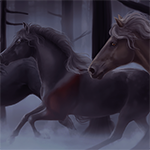09-25-2018, 12:17 AM
In the early hours of morning, Eilidh is wandering the meadow on a path that the moonlight illuminates.
She knows where it leads. In fact, the wildgrass is likely worn from her repeated travels. She comes here often, to think, to listen to the quiet. The next bend between two ancient oak trees bring her to the place that hurts her heart to look at, but will renew it to visit. When she rounds it she’ll feel the hot prickle of tears in her eyes.
The wheat grass grew wild. It took years, undoubtedly, but it had claimed inch by inch until the bulge of earth that hid her bones was lost beneath it. Here and there the grave is dotted with lilac cranesbill and yellow toadflax, and while the buds have closed tightly for the night, Eilidh imagines they must be quite beautiful in the daylight. She thinks Moselle would have liked that, and so a fragile smile finds her mouth. She had always loved a light in the darkness.
Eilidh moves her eyes to the sky, then. Moselle had come from the stars, and she wonders quietly if now she has returned to them; another light in the darkness.
Isn’t it funny how so much changes, when so much left is still the same?
And while years have changed the meadows outline and now poplars and birch trees stand where they hadn’t before, so much of it’s content remains. Her bones are still where Eilidh had buried them. Her mother was still dead, and the memory of that day still very much alive.
It was the last day she used her mind to move anything.
(Let it grow stagnant, and rot.)
She didn’t want to move mountains if it meant burying the things she loved beneath them.
She knows where it leads. In fact, the wildgrass is likely worn from her repeated travels. She comes here often, to think, to listen to the quiet. The next bend between two ancient oak trees bring her to the place that hurts her heart to look at, but will renew it to visit. When she rounds it she’ll feel the hot prickle of tears in her eyes.
The wheat grass grew wild. It took years, undoubtedly, but it had claimed inch by inch until the bulge of earth that hid her bones was lost beneath it. Here and there the grave is dotted with lilac cranesbill and yellow toadflax, and while the buds have closed tightly for the night, Eilidh imagines they must be quite beautiful in the daylight. She thinks Moselle would have liked that, and so a fragile smile finds her mouth. She had always loved a light in the darkness.
Eilidh moves her eyes to the sky, then. Moselle had come from the stars, and she wonders quietly if now she has returned to them; another light in the darkness.
Isn’t it funny how so much changes, when so much left is still the same?
And while years have changed the meadows outline and now poplars and birch trees stand where they hadn’t before, so much of it’s content remains. Her bones are still where Eilidh had buried them. Her mother was still dead, and the memory of that day still very much alive.
It was the last day she used her mind to move anything.
(Let it grow stagnant, and rot.)
She didn’t want to move mountains if it meant burying the things she loved beneath them.



![[Image: rhae]](https://66.media.tumblr.com/c013fae479a9e0c775688ff921306b4e/tumblr_pivbqpgHuG1xsr748o1_250.png)